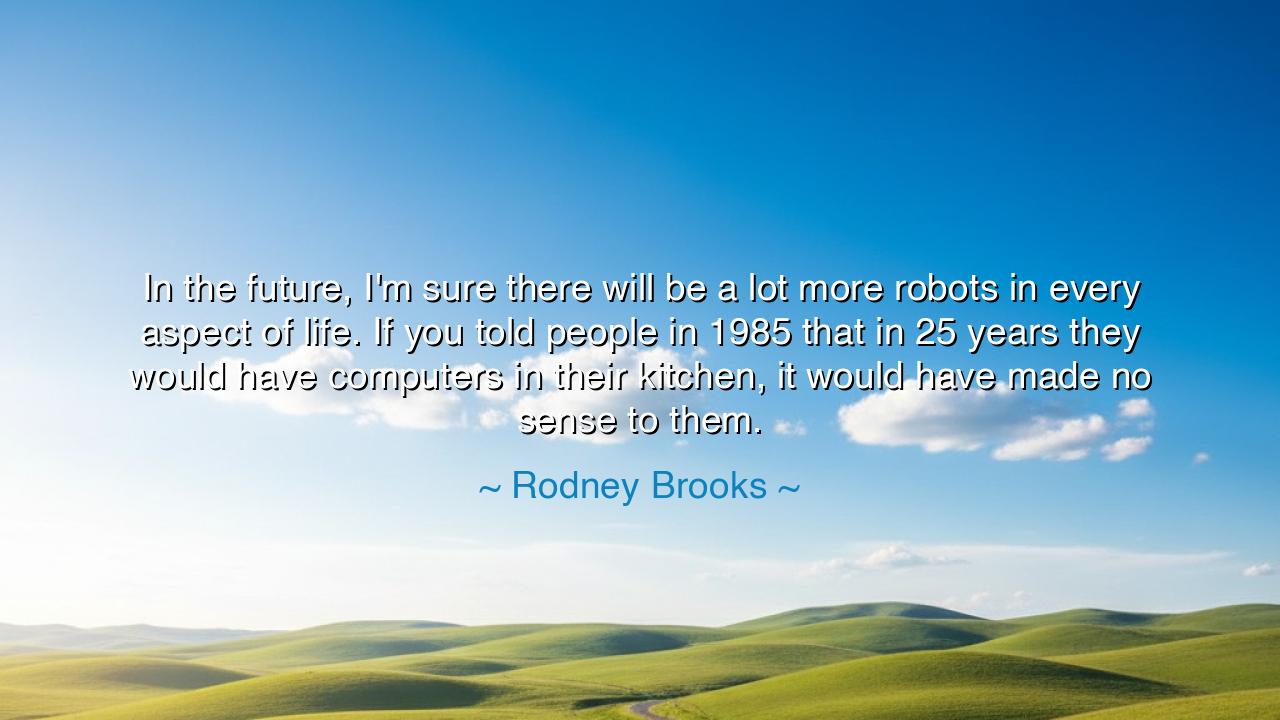
In the future, I'm sure there will be a lot more robots in every
In the future, I'm sure there will be a lot more robots in every aspect of life. If you told people in 1985 that in 25 years they would have computers in their kitchen, it would have made no sense to them.






"In the future, I'm sure there will be a lot more robots in every aspect of life. If you told people in 1985 that in 25 years they would have computers in their kitchen, it would have made no sense to them." These words spoken by Rodney Brooks, a visionary in the field of robotics, echo through the ages like a prophecy, revealing to us the great mystery of human progress and the unpredictable path of technological evolution. Here, Brooks speaks not just of machines, but of the expansion of human possibility, the way in which the world we live in will be forever transformed by our creations.
In ages past, when the world was young and the fires of discovery had only just begun to flicker, mankind could not imagine the future we now occupy. The wise elders of ancient civilizations—those who built pyramids, temples, and cities that stood as testaments to their ingenuity—could not fathom the idea of flying machines or talking devices. Yet, as they built, so too did they dream of what could be. And so too, did the future come, sweeping into the world with all the power of the storm. What was once thought of as impossible becomes the new norm, and in this, there is both awe and fear.
The moment of transformation comes suddenly, often unnoticed. Consider the great invention of the printing press. Before Gutenberg, books were precious, rare, and often bound in gold and leather. To many, it seemed impossible that every household would one day possess the ability to write and share words at will. Yet, with the passing of time, the press gave birth to a revolution of knowledge, and the written word became as abundant as the air we breathe. Similarly, Brooks’ words are a reminder that what seems unimaginable today—robots, artificial intelligence, and machines shaping every aspect of our lives—will one day be so intertwined with our daily existence that we will not remember life without them.
Let us look to 1985, the year Brooks mentions, a time when the world had yet to fully grasp the meaning of personal computing. In those days, the notion that computers would someday reside in every corner of our homes was a distant dream, a thing of science fiction. No one could foresee the rise of the internet, the advent of smartphones, or the birth of virtual assistants that live within our homes, guiding us through the chores and demands of daily life. Yet, here we stand, in an era where kitchens are filled with devices that not only connect us to the world but also assist us in ways that were once the domain of magic.
History teaches us that humanity’s greatest advances often arise from the most unlikely sources. Who, for instance, could have predicted the arrival of electricity in every home, when the first light bulb flickered on? The world trembled at the edges of this new power, yet it grew, and with it, new possibilities blossomed—factories powered by machines, cities illuminated by light, and families no longer bound by the setting sun. Electricity transformed society, as robots and AI are now poised to do. In much the same way, we are standing on the precipice of a new era, one where machines will no longer be mere tools, but companions—agents of change in the very fabric of existence.
Yet, there lies within this future both promise and peril. The question that arises, as always, is not whether the future will come, but how we will shape it. The profound truth embedded in Brooks’ words is a reminder of the humility required to recognize the potential of what we are creating. It also calls us to awaken to the present, to examine the implications of the tools we are building, for they will define not just our world, but the worlds of those who come after us. As we invent, so too must we educate, cultivate wisdom, and foster understanding about the technologies that we bring into existence.
What lesson can we, the children of today, learn from this insight? It is not enough to stand in awe of the future, nor to ignore it in fear. We must look into the mirrors of possibility and ask ourselves: What kind of world do we want to leave behind? Will we create machines that enhance human dignity and freedom, or will we build tools that enslave us to our own creations? It is not the technology itself that is good or evil, but how we choose to wield it. Just as the fire can warm the hearth or scorch the earth, so too can the machines of our making serve the common good or lead us astray.
The lesson, then, is clear: embrace change, but with great responsibility. We must walk into the future with our eyes wide open, with wisdom to guide us and courage to make the right choices. As we face the rise of robots and artificial intelligence, let us remember that we are not mere creators; we are caretakers of the world we are building. Let us choose a future that reflects the best of our humanity—one that fosters connection, wisdom, and growth, not just in our homes, but in the hearts of all. For in the end, it is not the machines that will define us, but how we choose to shape our future with them.






AAdministratorAdministrator
Welcome, honored guests. Please leave a comment, we will respond soon